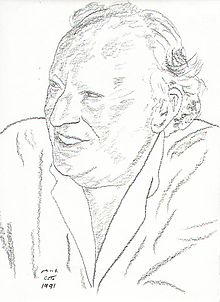Leon Uris

Leon Marcus Uris (born August 3, 1924 in Baltimore , Maryland , † June 21, 2003 in Shelter Island , New York ) was an American writer .
Life
Leon Uris was the son of a Jewish-Polish family. At the age of 17, he joined the United States Marine Corps . During the Second World War he was used in the South Pacific . During this time he met his first wife, Betty, who also served in the Marine Corps. After the war he became an editor.
He processed his war experiences in his first bestselling novel Battle Cry or Vacation until Awake (original: Battle cry ). He received inspiration for his most successful novel Exodus from his work as a correspondent in Israel . This novel made him known internationally in 1958. Since Uris had mentioned the name of the Polish doctor Władysław Alexander Dering in the novel Exodus and linked it to human experiments in the concentration camp , the latter sued him in a London court. Uris processed this story in the novel QB VII , which was also successful as a film and series.
Uris' popularity was increased in 1969 by Alfred Hitchcock's film adaptation of the novel Topas .
Leon Uris was married three times. From 1945 to 1965 with Betty Katherine Beck, from this marriage the three children Karen, Mark and Michael were born. His second marriage to Margery Edwards lasted only a few months until her death in 1969. From his third marriage to Jill Peabody from 1970 to 1989 he has two more children.
Works
- 1953: Battle cry
- 1955: The mountains got up ( The Angry Hills ), novel about the German occupation of Greece and the resistance
- 1958: Exodus , novel that tells the creation of the State of Israel and the history of the Jews up to the 20th century.
- 1960: Exodus Revisited , German: In the footsteps of Exodus , with 267 photos by Dimitrios Harissiadis, Kindler, Munich 1962, DNB 455189595 .
- 1961: Mila 18 , novel, translated by Peter de Mendelssohn: Heine, Munich 1991, ISBN 3-453-19918-9 (German first edition by Kindler, Munich 1961, the story of the uprising in the Warsaw ghetto ).
- 1963: Decision in Berlin (also Armageddon ), Heyne, Munich 1998, ISBN 3-453-13833-3 , novel about the immediate post-war period in Germany , which culminated in the Berlin Airlift .
- 1967: Topas ( Topaz ), novel against the backdrop of the Cuban Missile Crisis
- 1967: (The Third Temple)
- 1970: QB VII. A trial excites the world novel. Translated into German by Evelyn Linke. Kindler, Zürich 1970, ISBN 3-463-00484-4 ; as paperback: Heyne, Munich 1995, ISBN 3-453-00389-6 (a court drama against the background of the Holocaust ).
- 1975: Ireland A Terrible Beauty illustrated book with Jill Uris
- 1976: Trinity , novel, the conflict between Catholics and Protestants in Ireland has about
- 1981: Jerusalem Song Of Songs illustrated book with Jill Uris
- 1984: Hajj (The Haj) , novel that describes life in Palestine in the first half of the 20th century
- 1988: Mitla Pass , a novel about the Israeli Sinai campaign in 1956
- 1995: Insel der Freiheit ( Redemption , translated by Wulf Bergner and Bernhard Robben), Knaus, Berlin 1995, ISBN 3-8135-4000-6 , continuation of Trinity , with a detailed description of the Battle of Gallipoli from the perspective of a New Zealand ANZAC soldier Irish roots (one third of the content)
- 1999: (A God In Ruins)
- 2003: ( O'Haras Choice ), Novel, ISBN 978-0-06-056875-7 .
Filmography
Literary templates
- 1955: Battle Cry - directed by Raoul Walsh
- 1959: Hill of Secrets ( The Angry Hills ) - Director: Robert Aldrich
- 1960: Exodus - Director: Otto Preminger
- 1968: Topas ( Topaz ) - Director: Alfred Hitchcock - Script: Samuel A. Taylor
Script based on other authors' templates
- 1957: Gunfight at ( Gunfight at the OK Corral ) - Director: John Sturges
Others
When Joseph Heller started his book Catch-22 in 1953 , he called it Catch-18 . When it was published in October 1961, he had adjusted the title to avoid a similarity / confusion with Uris' recently published novella Mila 18 .
Web links
- Literature by and about Leon Uris in the catalog of the German National Library
- Leon Uris in the Internet Movie Database (English)
Individual evidence
- ↑ John W. Aldridge: The Loony Horror Of It All- 'Catch-22' Turns 25th New York Times, October 26, 1986, accessed June 21, 2017 .
- ^ A classic by any other name. The Telegraph (UK), November 18, 2007, accessed June 21, 2017 .
| personal data | |
|---|---|
| SURNAME | Uris, Leon |
| ALTERNATIVE NAMES | Uris, Leon Marcus |
| BRIEF DESCRIPTION | American writer |
| DATE OF BIRTH | August 3, 1924 |
| PLACE OF BIRTH | Baltimore , USA |
| DATE OF DEATH | June 21, 2003 |
| Place of death | Shelter Island , New York, USA |